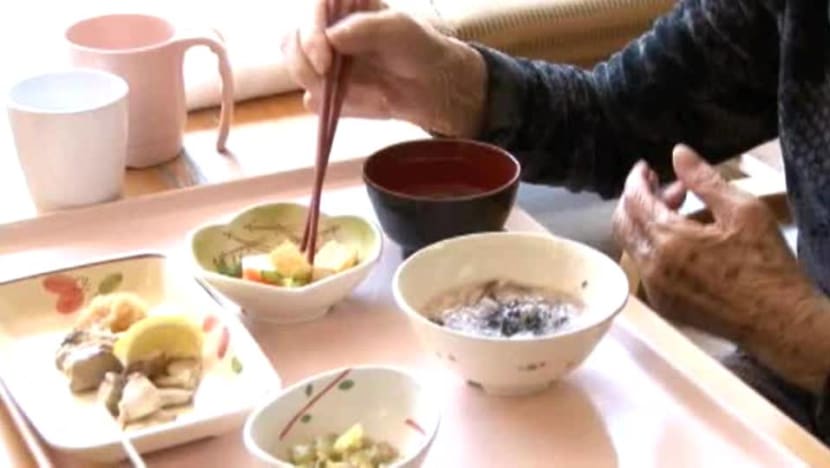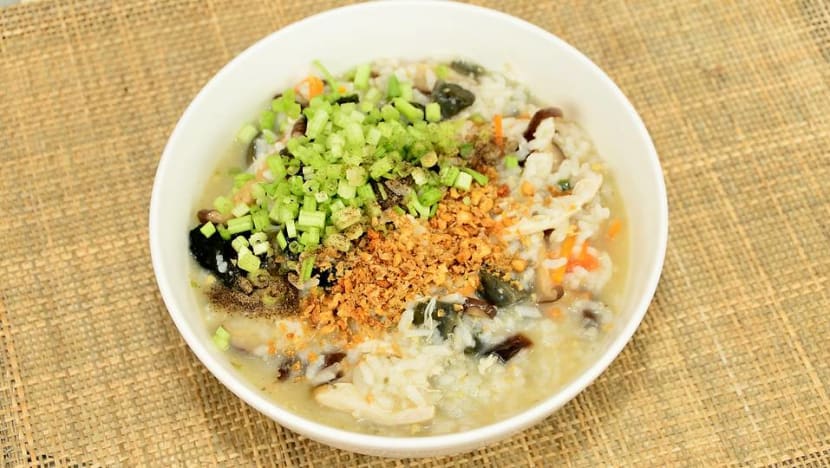Convalescing elderly patients need more protein to help them recover

(File photo)
SINGAPORE: Porridge, chicken essence and fish cartilage broth may be popular food for convalescing patients, but are they nutritionally sufficient for elderly ones?
Rice porridge is predominantly water or broth, with little carbohydrates, meat or protein. Rice water, which is often given to patients in Singapore and Asia, has little or no nutritional value, said Dr Jonathan Tan, senior consultant and director of the Surgical Intensive Care Unit at Tan Tock Seng Hospital.

Soups also have variable amounts of nutrients, so they may or may not be nutritionally adequate. How then do patients and caregivers ensure that their nutritional needs are met on the road to recovery?
In a study by Tan Tock Seng Hospital on 154 patients (with an average age of 77) in a nursing home in Singapore, the percentage of elderly subjects with under-nutrition and malnutrition was as high as 52 per cent. This research was published in the Journal of Nutrition Health and Aging in Jan 2010.
In fact, aged patients - as many as 25 per cent - are already malnourished at the point of admission into the hospital, according to a study published in the Journal of Parenteral and Enteral Nutrition in Nov 2016.
These are not good scenarios for older patients because in order to defend itself from malnutrition and chronic illness, the body breaks down muscles - which could lead to a longer time for wound healing and recovery from illness, said Professor Nicolaas Deutz, the director of the Center for Translational Research in Aging & Longevity from Texas A&M University’s Department of Health & Kinesiology.
“When someone is ill or hospitalised for a long period of time, we often hear them saying that their body feels like it’s breaking down, and there is some truth to that,” said Prof Deutz.
MALNUTRITION LEADS TO SLOW RECOVERY
How does nutrition affect recovery? That is where Prof Deutz’s NOURISH (Nutrition Effect On Unplanned Re-admissions and Survival in Hospitalised Patients) study, considered the largest, randomised, double-blind and placebo-controlled study, comes into play.
Published in the journal Clinical Nutrition in 2016, the research was carried out between May 2012 and Oct 2014, and based on 652 patients aged 65 years and above in the United States.
About half of the patients were given two servings of a high-protein oral nutritional supplement that has beta-hydroxybeta-methylbutyrate (HMB) and Vitamin D a day, while the rest were given a placebo twice daily.
Patients who took the supplement had a 50 per cent lower death rate after discharge, said Prof Deutz, the study’s lead author. Other changes included improved body weight, nutritional status, and Vitamin D levels up to the 90 days of post-discharge observation.
BOOSTING NUTRITION FOR PATIENTS
In lieu of the specialised nutrition supplement used in the NOURISH study, patients not getting sufficient nutritional intake can fortify their meals by adding extra protein with foods such as nuts, nut butters and milk. One could also add more minced meat, eggs, tofu or sesame oil to rice porridge.
"We suggest protein intakes of 1.2g to 1.5g per kilogram of body weight per day to meet their increased requirements during illness," said Prof Deutz.

However, not every patient has the appetite or ability to swallow, even though nutritional requirements are best met through food, recommended doctors.
“Bear in mind, patients tend to have higher nutritional needs yet often experience appetite loss in the hospital,” said Dr Tan.
“As much as possible, we try to advocate frequent snacks between meals. However, there are patients who require a texture-modified diet due to dysphagia (difficulty swallowing),” he said.
Smoothies made by blending fruit and vegetables with milk or yoghurt is one way to help patients who have trouble swallowing consume nutrient-dense food. However, blended foods tend to require watering down, which in turn, means lower nutritional density.
“That’s when we will advise [supplementing the diet] with oral nutritional supplements to prevent [nutritional] deficiencies,” said Dr Tan.
NUTRITION'S ROLE IN RECOVERING
One of the biggest takeaways from the NOURISH study is that it reinforces the role nutrition has in impacting health outcomes. Dr Duetz suggested that “all patients in hospitals and long-term care facilities are screened and assessed for malnutrition. We also suggest that protein intake is calculated for every patient in addition to caloric intake”.
While the study showed that taking two servings of the oral nutritional supplement yielded better outcomes, Dr Tan said it is still important to encourage patients to consume a diet that is comforting to their palate as it reduces stress, which is essential to recovery.
He added that patients in Singapore, who are found to be malnourished or at risk of malnutrition, are referred to dietitians.
“There exist many opportunities and potential points for intervention where we can firstly identify at-risk patients and intervene to reduce complications of malnutrition. This is what we hope to put in place moving forward,” he said.
COMMON SYMPTOMS OF MALNUTRITION
• Inability to concentrate
• Tiredness and irritability
• Always feeling cold
• Longer healing time for wounds
• Hollowed cheeks and sunken eyes as fat disappears from the face
• Dry and sparse hair that falls out easily














